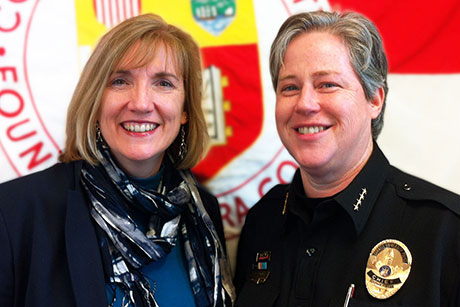Cornell Perspectives: Response and enforcement after a sexual assault
By Cornell Chief of Police Kathy Zoner and Judicial Administrator Mary Beth Grant
What’s being done at Cornell to address sexual violence? A series of articles that began with an interview with two student facilitators for Wingman 101 will present firsthand accounts from those who are on the front lines of the issue in our community.
The second installment features Cornell Police Chief Kathy Zoner and Judicial Administrator Mary Beth Grant.

MBG: What do we think we’re doing effectively about sexual violence? We’re doing a really good job at Cornell of making sure that there’s a fair and equitable process for both parties. We want to make sure that folks have the support they need: change of classes, no contact orders, change in housing, those kinds of things, whether or not they file a formal complaint. Some people don’t want to go through an adjudication, but they still need support through counseling and victim advocacy. If there is an investigation, we try to have a non-intimidating process where the parties don’t ever meet in person, with multiple opportunities to review all the evidence, testimony and written documents, and multiple steps for checks and balances. I think it’s a good process. We spend a lot of time on the investigation, because we want to make sure that everyone has an opportunity to be heard. We’re working on ways to maintain that level of fairness and effectiveness with a little bit more speed.
KZ: When someone reports a sexual assault to us (Cornell Police), our first goal is to make sure that person is okay. Do you need medical attention? Do you need psychological attention? What type of advocacy do you want? We are hopeful to get the information that we need to hold somebody accountable. But our primary concern is, are you okay?
MBG: A lot of times, however, the first place a student or colleague will go after an assault is to someone they know, which may include a faculty or staff member. It is very important all members of the Cornell community understand the reporting obligations related to sexual violence. Faculty and staff are obligated to consult with a Title IX Coordinator about an incident unless they are a designated confidential resource. Confidential resources include medical and mental health care providers at Gannett, counselors at the Faculty and Staff Assistance Program, the Victim Advocate, the LGBT director, the director of the Women’s Resource Center, staff in the Ombudsman’s office, and those providing pastoral care at Cornell United Religious Work. Detailed information about reporting is available on the university’s SHARE website.
The reason students may go to a faculty member or adviser is because they trust them. One way to honor that trust is to be really clear about the boundaries of confidentiality. Remind them that you will keep information private and only consult with other support people that are going to provide assistance to the student. Sometimes a student will want to know what’s going to happen after you consult with a Title IX coordinator. Generally, the student will get an email from me or someone from my office, saying something like: “I’m sorry; I heard something happened. I want you to be aware of the following resources, and I’m happy to talk to you further if you’d like.” And sometimes people write back and say, “Thanks, but no thanks”; other times they write back and say, “Yeah, originally I didn’t want to file a complaint, but now I’ve changed my mind.”
KZ: You know, after speaking to the Faculty Senate, someone came to me and said, you should talk about these things more often. I said, you need to watch “Building a Culture of Respect at Cornell,” because all of your questions are answered in that video. All those questions about liability, confidentiality, what should I do – it’s really well encapsulated in that conversation. And it’s from the perspective of a faculty member. We all agree on the end goals: education of people, changing the culture, making sure there’s collaboration across agencies, making sure people have a comfortable, reliable and educated place to bring their reports.
MBG: We are thinking more about how to change the cultural environment: respect, civility, what consent is. The metaphor is that people are falling into the water, and the work we do in adjudication is like throwing in life preservers so that they don’t drown. If you move a little further upstream, you can try to catch them before they fall in, for example, by having safe parties, by having the Wingmen and Consent-Ed and Cayuga’s Watchers present interventions. Then even further upstream we ask, why are people slipping in the first place? Let’s try to tackle that terrain.
Cornell University continually looks for ways to improve sexual assault prevention, enforcement and adjudication. Future opportunities will be announced for students, faculty and staff to provide feedback regarding upcoming improvements to Policy 6.4, which addresses Prohibited Discrimination, Protected-Status Harassment, Sexual Harassment, and Sexual Assault and Violence.
Media Contact
Get Cornell news delivered right to your inbox.
Subscribe